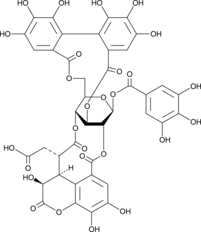Territorial Availability: Available through Bertin Technologies only in France
- Synonyms
- ?-D-glucopyranose, cyclic 3,6-[(1R)-4,4′,5,5′,6,6′-hexahydroxy[1,1′-biphenyl]-2,2′-dicarboxylate] 1-(3,4,5-trihydroxybenzoate), cyclic 2?2:4?1-ester with (2S)-2-[(3S,4S)-5-carboxy-3,4-dihydro-3,7,8-trihydroxy-2-oxo-2H-1-benzopyran-4-yl]butanedioic acid
- Correlated keywords
- 19293-38-0 Terminalia COX1 COX2 5LO 15LO NF?B RAW264.7 HCT 15 COLO205 DU145 K 562 3T3L1 anti-viral MDAMB231
- Product Overview:
Chebulagic acid is a polyphenol and tannin that has been found in T. chebula and has diverse biological activities.{47061,47062,47063,47065,47064} It is an inhibitor of COX-1, COX-2, and 5-lipoxygenase (5-LO; IC50s = 15, 0.92, and 2.1 ?M, respectively) as well as ?-glucosidase and 15-LO (IC50s = 0.05 and 24.9 ?M, respectively).{47061,47062} Chebulagic acid inhibits LPS-induced increases in inducible nitric oxide synthase (iNOS), COX-1, COX-2, and 5-LO protein levels, production of NO, prostaglandin E2 (PGE2), and reactive oxygen species (ROS), and nuclear translocation of NF-?B in RAW 264.7 macrophages in a concentration-dependent manner.{47063} It inhibits the growth of HCT15, COLO 205, MDA-MB-231, DU145, and K562 cancer cells (GI50s = 20.3, 18, 26.2, 28.54, and 30.66 ?M, respectively).{47061} Chebulagic acid increases insulin-stimulated glucose uptake in 3T3-L1 adipocytes by 10.2-, 13.8-, and 16.6-fold when used at concentrations of 10, 50, and 100 ?M, respectively.{47065} It also scavenges 2,2-diphenyl-1-picrylhydrazyl (DPPH) radicals (IC50 = 1.4 ?M) and exhibits antiviral activity against cytomegalovirus, hepatitis C virus, dengue virus, measles virus, and respiratory syncytial virus in vitro (EC50s = 25.5, 12.16, 13.11, 34.42, and 0.38 ?M, respectively).{47061,47064}
Cayman Chemical’s mission is to help make research possible by supplying scientists worldwide with the basic research tools necessary for advancing human and animal health. Our utmost commitment to healthcare researchers is to offer the highest quality products with an affordable pricing policy.
Our scientists are experts in the synthesis, purification, and characterization of biochemicals ranging from small drug-like heterocycles to complex biolipids, fatty acids, and many others. We are also highly skilled in all aspects of assay and antibody development, protein expression, crystallization, and structure determination.
Over the past thirty years, Cayman developed a deep knowledge base in lipid biochemistry, including research involving the arachidonic acid cascade, inositol phosphates, and cannabinoids. This knowledge enabled the production of reagents of exceptional quality for cancer, oxidative injury, epigenetics, neuroscience, inflammation, metabolism, and many additional lines of research.
Our organic and analytical chemists specialize in the rapid development of manufacturing processes and analytical methods to carry out clinical and commercial GMP-API production. Pre-clinical drug discovery efforts are currently underway in the areas of bone restoration and repair, muscular dystrophy, oncology, and inflammation. A separate group of Ph.D.-level scientists are dedicated to offering Hit-to-Lead Discovery and Profiling Services for epigenetic targets. Our knowledgeable chemists can be contracted to perform complete sample analysis for analytes measured by the majority of our assays. We also offer a wide range of analytical services using LC-MS/MS, HPLC, GC, and many other techniques.
Accreditations
ISO/IEC 17025:2005
ISO Guide 34:2009
Cayman is a leader in the field of emerging drugs of abuse, providing high-purity Schedule I-V Controlled Substances to federally-licensed laboratories and qualified academic research institutions for forensic analyses. We are certified by ACLASS Accreditation Services with dual accreditation to ISO/IEC 17025:2005 and ISO Guide 34:2009.





